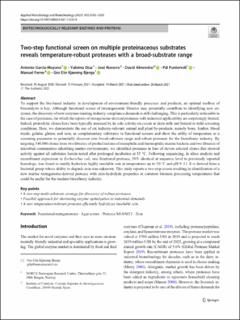| dc.description.abstract | To support the bio-based industry in development of environment-friendly processes and products, an optimal toolbox of biocatalysts is key. Although functional screen of (meta)genomic libraries may potentially contribute to identifying new enzymes, the discovery of new enzymes meeting industry compliance demands is still challenging. This is particularly noticeable in the case of proteases, for which the reports of metagenome-derived proteases with industrial applicability are surprisingly limited. Indeed, proteolytic clones have been typically assessed by its sole activity on casein or skim milk and limited to mild screening conditions. Here, we demonstrate the use of six industry-relevant animal and plant by-products, namely bone, feather, blood meals, gelatin, gluten, and zein, as complementary substrates in functional screens and show the utility of temperature as a screening parameter to potentially discover new broad-substrate range and robust proteases for the biorefinery industry. By targeting 340,000 clones from two libraries of pooled isolates of mesophilic and thermophilic marine bacteria and two libraries of microbial communities inhabiting marine environments, we identified proteases in four of eleven selected clones that showed activity against all substrates herein tested after prolonged incubation at 55 °C. Following sequencing, in silico analysis and recombinant expression in Escherichia coli, one functional protease, 58% identical at sequence level to previously reported homologs, was found to readily hydrolyze highly insoluble zein at temperatures up to 50 °C and pH 9–11. It is derived from a bacterial group whose ability to degrade zein was unknown. This study reports a two-step screen resulting in identification of a new marine metagenome-derived protease with zein-hydrolytic properties at common biomass processing temperatures that could be useful for the modern biorefinery industry. | en_US |

